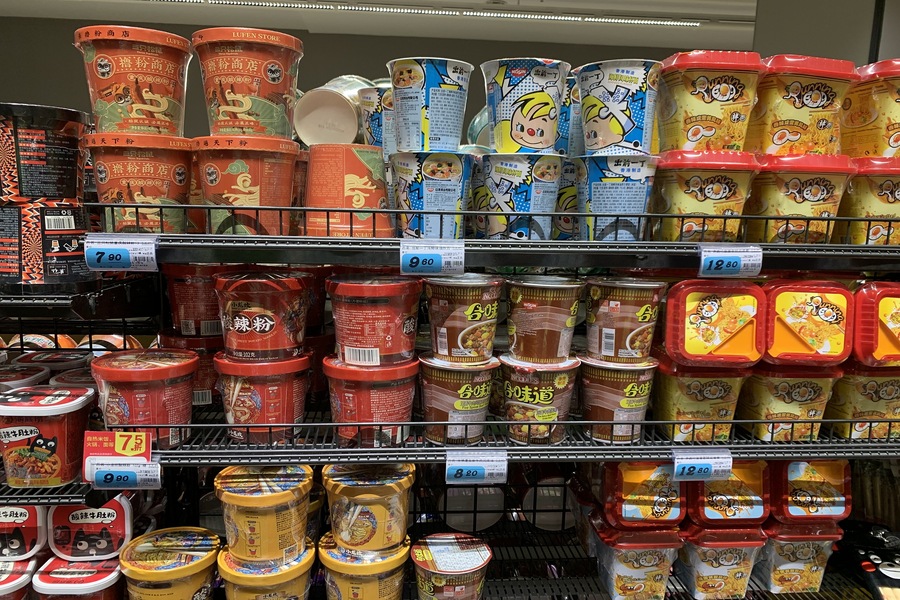Nissin Outperforms in China’s Shrinking Instant Noodle Market

Company’s parent says it will use steady promotion to seize the huge business opportunities in China
Key Takeaways:
- Nissin Foods’ revenue in China grows 10.3% in third quarter, as it outperforms market’s two leading instant noodle companies
- Company continues to strengthen its flagship products and expand its sales area in drive to boost market share
By Jony Ho
Mainland China- and Hong Kong-focused instant noodle maker Nissin Foods (1475.HK) announced last Friday that revenue for the first three quarters of this year reached HK$2.86 billion ($367 million), up 6.4% year-on-year. But the company’s performance in Hong Kong and on the Chinese mainland were quite different.
Shrinking demand for instant noodles and frozen food in Hong Kong caused Nissin’s revenue from the city to fall by 4.8% to HK$1.18 billion. In sharp contrast, its revenue for China rose by 11.9% year-on-year to HK$1.95 billion, accounting for 62.3% of its total, mainly due to growing sales of higher value-added products, especially cup noodles. The parent company, Nissin Foods Holdings, stated that it will continue to promote its “Cup Noodles” brand in the future to seize the big business opportunities in China.
As China’s food manufacturing industry matures, opportunities for growth have become limited for food manufacturers. But Nissin has defied the slowdown by posting sustained growth.
During the third quarter, Nissin’s Mainland China revenue grew by 10.3% year-on-year to HK$697 million, even as its Hong Kong’s revenue fell by 6.2%. But even though overall revenue grew 3.6%, increases in raw material prices and tax rates caused the company’s gross profit rate to fall by 1.8 percentage points, and net profit to fall 27%, outpacing the 13.6% drop in the first half of the year.
Nissin’s share price has moved down recently from around HK$6 in early October to its current level around HK$5.50, which may reflect the pressure on its margins.
Despite being considered a “beneficiary stock” during the pandemic as many people stayed home to eat, the market view has been less optimistic on Nissin. A Daiwa research report pointed out that Nissin’s gross profit margin in the third quarter was only 30.6%, a low since the first quarter of 2019.
And though the company’s Mainland China revenue is still growing, its Hong Kong business has become a “pain point”, as both revenue and operating profit margins have shrunk year-on-year and quarterly. As a result, Daiwa maintains a “hold” rating on Nissin with a target price of HK$6, which is a 7.7% reduction from its target in May this year.
Beating Market Leaders
Nissin Foods, a Japanese company with a market value of about HK$5.9 billion, is much smaller than China’s two leading instant noodle makers Uni-President China (0220.HK) and Tingyi Holding (0322.HK). The dominant pair are valued at about HK$27.3 billion and HK$87.5 billion, respectively, making them 3.6 times and 13.8 times the size of Nissin Foods.
However, Nissin’s industry-beating performance shows that “bigger may not always be better”. While Uni-President China and Tingyi have yet to announce third-quarter results, both trailed Nissin in the first half of the year. Nissin Foods’ revenue grew 6.8% year-on-year during that period to HK$1.85 billion, while Uni-President China’s instant noodle business revenue dropped by about 10% to 4.4 billion yuan ($689 million). Tingyi Holding’s instant noodle revenue also dropped by 14.7% year-on-year to 12.72 billion yuan, with its related gross profit rate dropping by 6.46 percentage points to 23.89%.
In terms of valuation, Nissin is also ahead of the two leaders. Its historical price-to-earnings ratio (PE) is now about 19.7 times, which is slightly higher than Tingyi’s 17.9 times and Uni-President China’s 14 times. That reflects a brand effect that may give Nissin a premium in valuation terms.
At the start of the Covid-19 outbreak, “Eat at home” became mainstream in the first half of 2020, stimulating instant noodle sales. But with the pandemic’s easing, consumption has returned to more normal levels, and consumers have changed their focus from cheap, convenient, and trouble-free factors to health, food quality and consumer experience. Even though Nissin’s products may not actually be “made in Japan”, as a Japanese brand, the company offers more different taste options, and has some other comparative advantages over its larger rivals, making its products more attractive in the China market.
Nissin’s parent has said it believes the high-value-added noodle market will continue to expand in mainland China. The group will continue to strengthen its “Cup Noodle” brand and expand its sales to other areas to boost its market share.
Behind Expanding Productivity
It’s worth noting that even as its Hong Kong sales are shrinking, Nissin is expanding its production capacity. The company announced this week it received a HK$15 million grant from Hong Kong’s Innovation and Technology Agency to set up a new smart production line in the city’s Tai Po area. Through the introduction of automation, robotics and smart sensors, the Nissin instant noodle production process can be automated to improve efficiency and productivity, it said.
At present, most of the cup noodles sold in Hong Kong are made in Mainland China. But at the same time many consumers in Mainland China and even EU countries often find a preference for “made in Hong Kong” Nissin cup noodles. Thus even as the Hong Kong market shrinks, Nissin’s expansion plan could be aimed at boosting sales by selling “made in Hong Kong” products outside its two main markets.
To subscribe to Bamboo Works free weekly newsletter, click here






